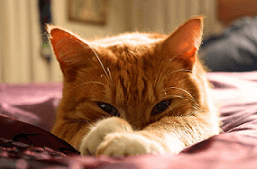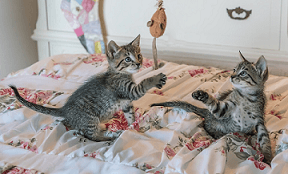We tend to think of cats as solitary creatures that do well on their own, but many a vet and scientist would disagree. As a domesticated companion species, cats thrive – if not depend – on regular human company and interaction. They also enjoy the companionship of dogs and their fellow felines.
When cats don’t get the attention and stimulation they need, they can quickly develop behavioural problems associated with stress, boredom, loneliness and depression. This is usually only apparent with ‘innie’ cats that don’t venture outside.
Although we usually associate ‘separation anxiety’ with dogs, cats are equally prone to similar feelings of frustration and loneliness when left alone for long periods of time. Households with only one cat - and one cat that lives exclusively indoors – are likely to have bigger problems with loneliness.
As well as taking note of the following signs, it is important to pay close attention to your cat's body language when deciding if your cat is unhappy or not.
 - Lonely cats will vocalise a lot to attract your attention and alert you to a problem. Excessive meowing usually happens when you return from work or being away somewhere, and may continue long after you return or until you give your cat a cuddle or engage in some play. Soft purring is very different and usually signals contentment.
- Lonely cats will vocalise a lot to attract your attention and alert you to a problem. Excessive meowing usually happens when you return from work or being away somewhere, and may continue long after you return or until you give your cat a cuddle or engage in some play. Soft purring is very different and usually signals contentment.
- Some cats may become aggressive when you go to leave them or when you come home again. Frustration at being left without company all day is usually what causes this, so be wary of 'rewarding' the behaviour with excessive petting and treats, but leave your cat to settle down and come round of its own accord. The aggression may be directed at the caregiver, another pet, or even at furniture and belongings in the home. When a cat scratches a lot, especially in areas where it shouldn't, it is trying to get your attention and provoke a reaction.
- A lonely cat may groom and lick itself constantly, which is often a sure sign of stress. In the absence of any medical problem, your cat's excessive grooming could be caused by loneliness and needs careful observation.
- Loss of appetite or increased appetite (constantly demanding food) is another stress indicator you should look out for. Take your cat along to the vet to check this out before assuming it is loneliness-induced. Demanding food and then eating very little of it may suggest your cat is attention-seeking.
- Urinating and defecating inappropriately, including spraying outside the litter box, may be another cry for help.
- Lack of activity and prolonged periods of sleep may also be evident in lonely cats.
 To try and combat these signs and improve your cat's happiness, think about enriching the environment so there is plenty to keep your cat occupied during the day. Interactive toys are great fun and also engage your cat's senses for extended periods of play.
To try and combat these signs and improve your cat's happiness, think about enriching the environment so there is plenty to keep your cat occupied during the day. Interactive toys are great fun and also engage your cat's senses for extended periods of play.
Flashing balls and treat dispensers will give your cat something to chase after, and scratching/climbing posts will give them somewhere to explore, rest and feel safe. When placed by the window they provide an excellent vantage point for cats to watch the outside world.
If it is a feasible option for you, consider getting a second cat (a rescue would be ideal) to keep your cat company. While not all relationships will work, when introduced properly and both cats are given the time and space to adjust, there is every chance the friendship will flourish. Many people report that their single cats are more relaxed and confident when given a companion, which is the case for dogs and humans alike!
There are also products you can buy to prevent conflict and promote a harmonious environment, such as Feliway Friends and SettleMe calming supplement. Of course there will be some cats that are not affected by stress or loneliness at all.
If you have comments to share, please post them below or email us directly! [email protected]
Written by: Hannah








